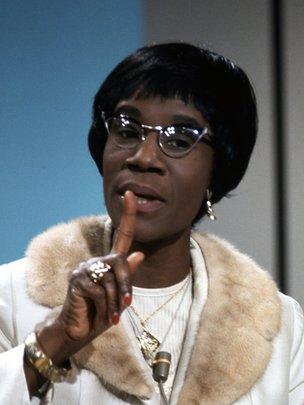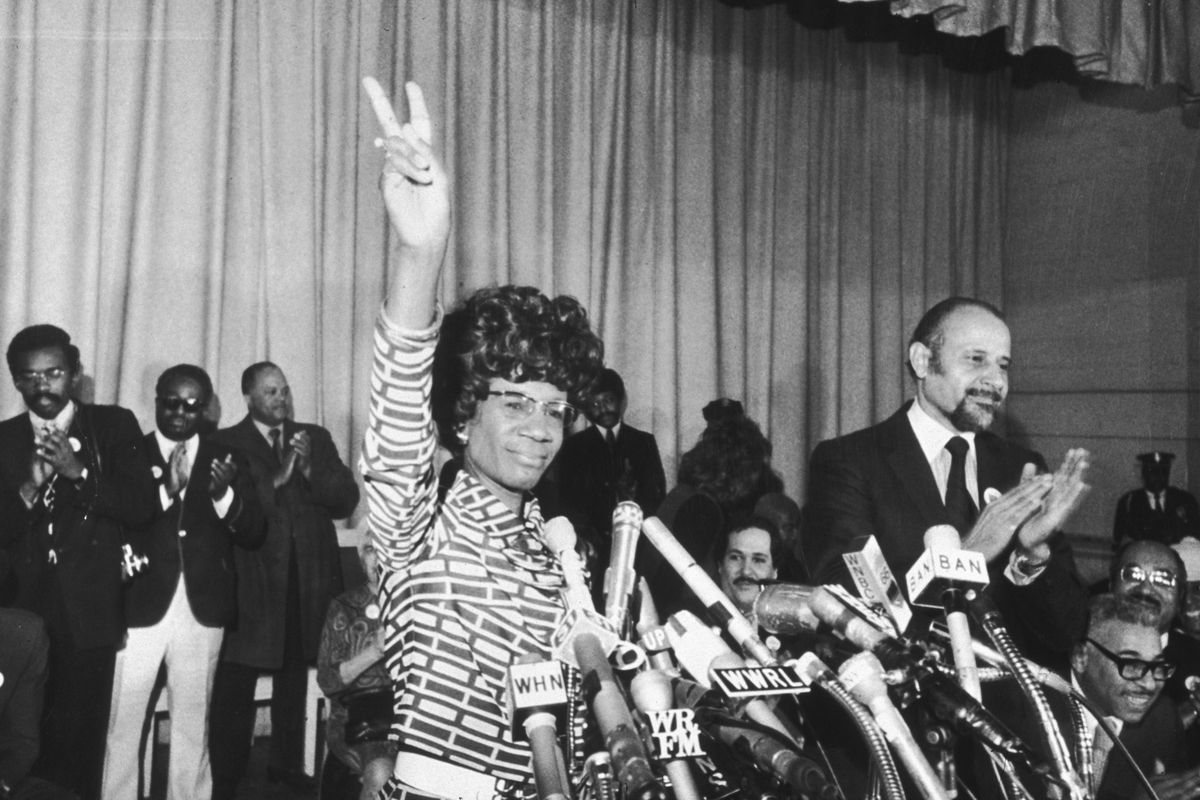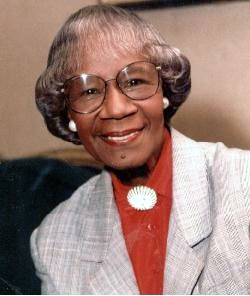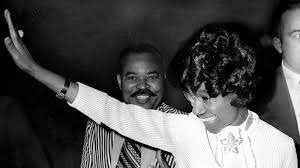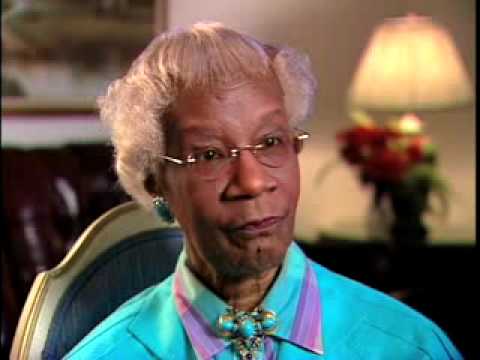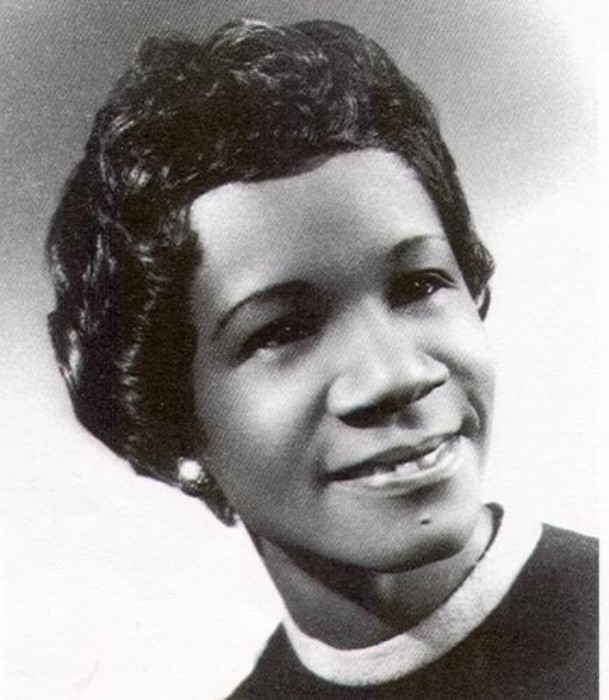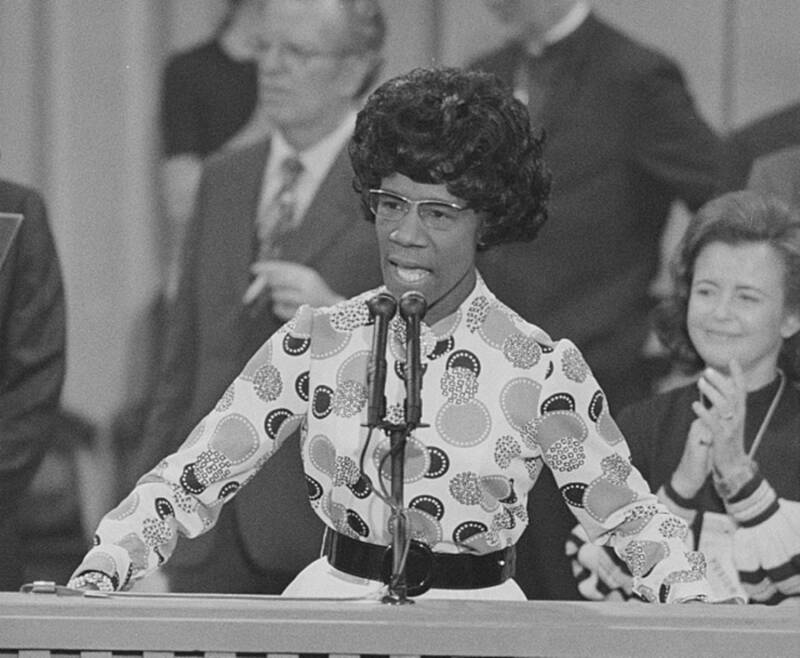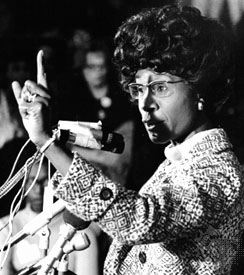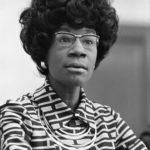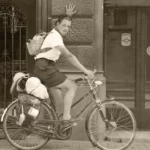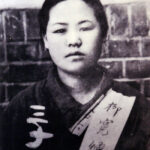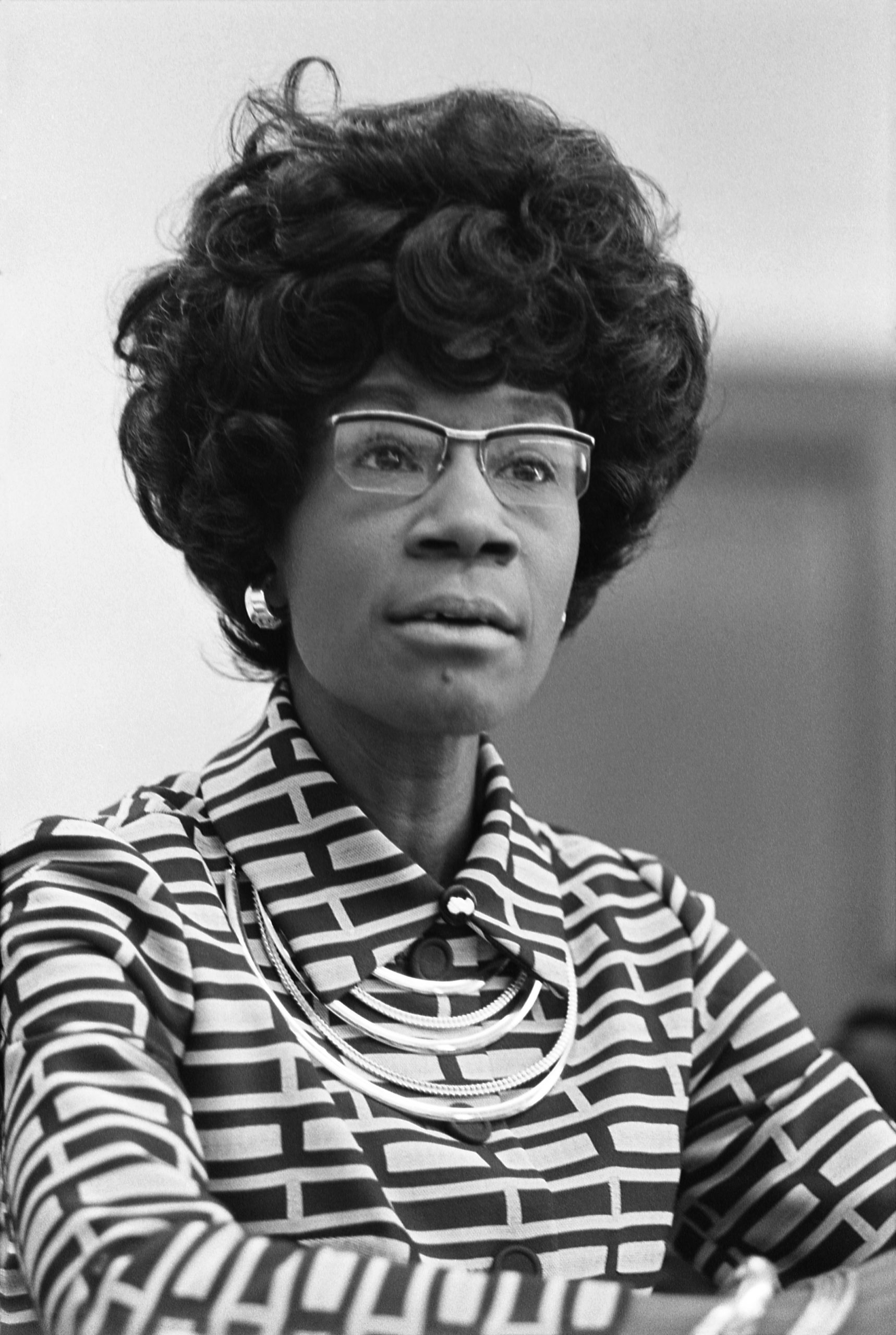
Shirley Chisholm
First African American Woman to Run for President of the United States
Check out the episode to learn more about this incredible woman who knew how to go above and beyond the call to “reach across the aisle,” & who managed to find the good in almost every bad situation.
“I stand before you today as a candidate for the Democratic nomination for the presidency of the United States of America.”
“I am not the candidate of black America, although I am black and proud. I am not the candidate of the women’s movement of this country, although I am a woman, and I’m equally proud of that, I am not the candidate of any political bosses or fat cats or special interests. I stand here now without endorsement from many big name politicians or celebrities or any other kind of prop. I do not intend to offer to you the tired and glib cliches which for too long have been accepted part of our political life. I am the candidate of the people of America.”
Episode Transcript
(please excuse any errors, spelling or otherwise – audio transcription is tricky)
Well, hello and welcome to BROADS YOU SHOULD KNOW the podcast about amazing and noteworthy women in history. I am Sara Gorsky.
Sam Eggers 3:26
I’m Sam Eggers.
Chloe Skye 3:27
I am Chloe Skye
Sara Gorsky 3:29
And I am bringing you one of the most badass broads. You guys, I’m so pumped. She’s a political broad. Have you guys heard of Shirley Chisholm?
Sam Eggers 3:40
No.
Chloe Skye 3:41
I saw a post about her on Instagram this week, but it was very, very light on details.
Sara Gorsky 3:49
Well, that’s great, because I’m gonna fill in all the details for you. Excellent. She is a fantastic broad I don’t want to start with a summary. I’m gonna like lead to it this time listeners, so strap in for the ride. And let’s dig in to Shirley Chisholm.
Sara Gorsky 4:08
So Shirley was born Shirley Anita St Hill on November 30, 1924 in Brooklyn, New York. Her father was from British Guiana, and her mother from Barbados. So they were both immigrants. She had three younger sisters, and her mother was really struggling to care for her and work full time, so at one point, they just ship all the kids to live with her mother in Barbados, their grandmother, Emmeline seel, so they lived on their grandmother’s farm in the they say, the VOH Hall village in Christchurch. And while she was there, she attended a strict British style, one room schoolhouse that took education very seriously, in quote marks, very seriously.
Sara Gorsky 4:51
Later on in her life, she’d say, quote years later, “I would know what an important gift my parents had given me by seeing to it that I had my early education in the strict traditional British style schools of Barbados. If I speak and write easily now that early education is the main reason.” A little preview, because education is a part of what she does.
Sara Gorsky 4:51
So she is returned back to Brooklyn in 1934 so she’s 10 years old at this point, but at that point, she always kind of considered herself a Barbadian American because of her time there. So she was there in like her these very formative young years. She also set up her grandmother. That quote. Granny gave me strength, dignity and love. I learned from an early age that I was somebody I didn’t need the black revolution to tell me that I love that quote. And then she is back in Brooklyn, so after Barbados, and she goes to an integrated girls school, and eventually she gets her Bachelor of Arts from Brooklyn College in 1946 and she gets a bunch of awards for her debating. She was a member of Delta Sigma Theta sorority, and she was also a member of the Harriet Tubman society, which that organization advocated for inclusion, integration of black soldiers in the military during World War Two, and then the addition of courses that focused on African American History and the involvement of more women in the student government body. So Frank kind of from an early age, she was very, very into politics, and it’s worth noting that it didn’t just happen in politics. Her dad also was heavily involved with the trade union, and at the time, when she was in Barbados, there’s a lot of workers and anti colonial independence movements going on. So she kind of witnessed a lot of this kind of political activity, and she kind of caught the bug. And so in the late 1940s she met, she meets Conrad Chisholm, and they marry in 1949 he’s a he was a PI. He’s a private investigator, so cool. And she Shirley teaches a nursery school while she is earning her MA in elementary education at Columbia University. And then she works in several different leadership positions at different nursery schools. Different nursery schools and daycares, and she becomes locally known in her area of Brooklyn as kind of an authority on early education and child welfare. And at the same time, she starts volunteering for a bunch of political clubs in Brooklyn. And at that time, most of them were actually, I think all of them were pretty white, dominant and they had what were the names? They were the Brooklyn democratic clubs, the Bedford stews, I can’t say this. Do you guys know New York better than me? Bedford,
Sam Eggers 7:31
Bedford Stuy.
Sara Gorsky 7:33
Bedford Stuyvesant.
Sam Eggers 7:34
Yeah. Bedford Stuyvesant
Sara Gorsky 7:36
Sam swooping in to save the day. So the Bedford Stuyvesant political League and the League of Women Voters. So she works with all those organizations, and she was also a representative of the Brooklyn branch of the National Association of College women. And in all the political organizations she was involved with at the time and throughout her life, she really was seeking to make really meaningful changes to the structure and the makeup of the organizations, and specifically the Brooklyn democratic clubs, which were so white, she was really trying to recruit in more people of color. And she was there in the 17th district, was where she was so she was really trying to help increase the diversity of the Democratic Party at that time. And she becomes a Democratic member of the New York State Assembly in 1965 and she serves three years from 1968 sitting in the 175th 76 and 177th New York state legislatures. One of her very early activities when she was in the assembly was to argue against the state’s literacy test, which was requiring English. And she she said that when she was fighting against this, she said, quote, just because a person functions better in his native language, is no sign a person is illiterate.
Sam Eggers 8:54
Is this a literacy test for voting that you had to take?
Sara Gorsky 8:58
Yes, yeah. It’s like voting rights. Oh, okay, so she’s kicking ass in the New York State Assembly. And in May of 1965 she’s she gets an honor for for a Salute to Women doers. In early 1966 she becomes a leader in a push by the statewide Council of elected, elected Negro Democrats for black representation on key committees in the assembly. And then in 1968 she up levels, and she runs for the US House of Representatives for New York’s 12th congressional district. So what is interesting about that race is that the district had just been this is going to be like politically nerdy. So if you are a political nerd, get super excited. If you’re not a political nerd, just hang on. It’s not gonna be like this forever.
Sara Gorsky 9:51
So at that time, the New York’s New York’s 12th district had just been redrawn to be a little more representative. Of the community it was actually representing. And so the redraw meant that kind of, everybody was anticipating that the new representative was going to be black, because that neighborhood was specifically black, and the way it had been drawn before, kind of like was all messed up, right? So the white incumbent in the race is running in a different district now, and there were all these new like black politicians coming in and running for office. Her her campaign motto, her campaign slogan was “unbought and unbossed”.
Sam Eggers 10:36
Oh, that’s good.
Sara Gorsky 10:37
I love it. I love it. And she wins the primary, she defeats her two other black opponents for the Democratic primary, and then in the general election, there’s this huge upset, because she defeats the Republican who he well, he wasn’t a Republican, actually, technically, he was running as the literal party, but backed by the Republican Party. His name was, his name was James Farmer, James L farmer Jr, and he was the former director of the Congress of Racial Equality. So he was, like, very expected to win, because he’s this, like, you know, little local celeb, and she not only beats him, but she defeats him by a two to one margin.
Sam Eggers 11:25
Ooh, apparently he wasn’t unbought and unbossed.
Sara Gorsky 11:30
And some of the stories already were talking about how she, just like, had like a megaphone out her car window, just driving around the neighborhood, and just like, shouting out our tooths, and she nailed it two to one margin, amazing. And she becomes the first black woman elected to Congress, and the only woman in the freshman class of that particular year of Congress.
Sam Eggers 11:52
Wow.
Sara Gorsky 11:53
Rad as fuck, right? And
Chloe Skye 11:55
And which year can you say the year again?
Sara Gorsky 11:57
1968.
Chloe Skye 11:59
’68. Wow.
Sara Gorsky 12:04
But then, right? So, so she’s elected. She’s super pumped, but right away, she gets assigned to the house Agricultural Committee. And she’s like, I represent fucking urban New York, Brooklyn. Why the fuck am I on the Agricultural Committee? And she was super frustrated about it. She’s like, why am I on this committee? And she, she’s kind of like, bitching and moaning. And I actually didn’t know this guy, Rabbi Menachem Mendel? Have you heard of his name before? No, me. Mendel, oh, wait, sorry, I didn’t say his whole name, Menachem Mendel Schneerson. He apparently is this huge, huge leader of the period, particularly, I think, of the Jewish community. But he was this, this big activist. And she goes to him, and she’s like, I can’t believe I’m on this committee. And he’s like, Well, maybe you can see if you can use the extra food, like the surplus and feed your people, or something like that. And she was like, Hmm, maybe I can. So what she’s able to do is she’s able to use her position on the committee to help expand the food stamp program.
Sam Eggers 13:17
Oh, cool,
Chloe Sky 13:18
Nice.
Sara Gorsky 13:18
Which is kind of crazy, right? And then she goes on and she’s able to create the special Supplemental Nutrition Program for Women, Infants and Children, which is more commonly known as WIC, w i c.
Chloe Skye 13:32
I’ve definitely seen that.
Sara Gorsky 13:33
Yeah, which still exists today, that still today, is helping feed families.
Chloe Skye 13:38
Talk about turning lemons into lemonade.
Sam Eggers 13:40
Yeah!
Chloe Skye 13:41
Or agriculture, into helping your community,
Sara Gorsky 13:44
Right? And then finally, after all this, after spending her time in the Agricultural Committee, she’s also placed on the Veterans Affairs Committee, which was like another leg up, not the lowest of the low committees. And then finally, after some wheeling and dealing and supporting some fellow dems. She is finally assigned to the the Education and Labor Committee, which had really been her goal kind of all along. She’s like, this is what I do. This is where I want to be. She finally gets there. And the time, the whole time she’s in office, the whole time that she is in Congress, her entire staff that she hires is all women, half of them are black women.
Chloe Skye 14:21
Gotta bring people in who actually know what we’re fighting against.
Sara Gorsky 14:25
Yeah. And then I have like, a short punch list of the things she does when she’s holding this office. So other things she does. She helps found the Congressional Black Caucus in 1971 she’s a founding member of the National Women’s Political Caucus. She introduces a bill to provide 10 billion in federal funds for child care services in 1975. It did not, however, pass, because Nixon vetoed it, saying it was too expensive and, quote, “would undermine the institution of the family.”
Sam Eggers 14:55
Oh, yeah.
Chloe Skye 14:57
Of course. That sounds that. Sounds like Nixon.
Sam Eggers 15:01
Big shocker there.
Sara Gorsky 15:02
And then 95th and 96th Congress, Shirley is elected Secretary of the House Democratic Caucus, which is a huge leadership position for the Democrats. And then, this is the biggest thing she’s known for – on January 25, 1972 I’m gonna play this clip for you guys because it’s just, like, too good. I just don’t want to summarize it.
Shirley Chisholm 15:31
“I stand before you today as a candidate for the Democratic nomination for the presidency of the United States of America.”
Sam Eggers 15:40
Oh, yeah.
Chloe Skye 15:41
Okay.
Sara Gorsky 15:43
Hell yeah. I’m gonna make you listen to the next part too, because it’s rad.
Shirley Chisholm 15:47
“I am not the candidate of black America, although I am black and proud. I am not the candidate of the women’s movement of this country, although I am a woman, and I’m equally proud of that, I am not the candidate of any political bosses or fat cats or special interests. I stand here now without endorsement from many big name politicians or celebrities or any other kind of prop. I do not intend to offer to you the tired and glib cliches which for too long have been accepted part of our political life. I am the candidate of the people of America.”
Sam Eggers 16:48
Yes!
Sara Gorsky 16:49
So she announces her bid for President of the United States.
Chloe Skye 16:55
Where do I vote? That was a great speech.
Sam Eggers 16:57
I know. Right,
Sara Gorsky 16:59
Right? Right! She is the first black major party candidate to run for president, and she’s the first woman to run on the Democratic ticket. There was one woman who had run on a Republican ticket previously.
Sam Eggers 17:12
Did you say, What year was this?
Sara Gorsky 17:14
This was in 1972.
Chloe Skye 17:18
Wow. What year? What did the Republican Woman run? Do you know?
Sara Gorsky 17:21
Oh, I can look it up. I still have the tab open. Okay, I found it. It’s uh, so, um, US Senator Margaret Chase Smith had previously run for the Republican presidential nomination in 1964.
Chloe Skye 17:34
Okay.
Sara Gorsky 17:35
So, like, eight years before this.
Chloe Skye 17:37
So recently.
Sara Gorsky 17:38
There had been a – but she was Republican, not Democrat,
Chloe Skye 17:41
And that was when Republican Party was, like, more or less the current Republican Party, not like back when Lincoln was a Republican and it was a different party.
Sara Gorsky 17:51
Yeah, it wasn’t like, was it the Republican Party of today, for sure.
Chloe Skye 17:55
Not exactly, not exactly, but, but it’s like their beliefs more or less aligned with the direction they want the country to go in.
Sara Gorsky 18:04
Yes, pretty much. And Shirley is not like she is not like some golden goddess of the Democratic Party, like the Democratic party didn’t actually even want her to run.
Chloe Skye 18:15
Of course.
Sara Gorsky 18:17
They were much more interested…
Chloe Skye 18:18
Democratic Parties has white supremacists, too.
Sara Gorsky 18:20
And they were waiting and waiting to figure out who they were gonna kind of like, nominate as their kind of golden boy. And she was like, fuck it. I’m just gonna fucking run. So she just does it. She’s got the experience, she’s got the know how, but she’s super underfunded, so her whole campaign, the entire campaign, ends up spending only $300,000.
Sam Eggers 18:41
Oh my god.
Chloe Skye 18:42
Wow.
Sara Gorsky 18:43
And I know obviously that was, this is like 50 years ago, but Hillary Clinton’s 2016 campaign spent 768 million.
Sam Eggers 18:53
God.
Chloe Skye 18:54
That was quite different.
Sara Gorsky 18:56
So she was like, super grassroots, super DIY. She was, like, really kind of just doing it herself, with the people that believed in her and the Democratic Party, kind of like ignored her and even her her black male colleagues, they failed to show a lot of support. There was a quote later on, she said, “When I ran for Congress, when I ran for President, I met more discrimination as a woman than for being black. Men are men.”
Sam Eggers 19:24
Wow.
Sara Gorsky 19:25
And in particular, she expressed a lot of frustration about the quote black matriarch thing. She said, “They think I’m trying to take power from them. The black man must step forward. But that doesn’t mean the black woman must step back.”
Sara Gorsky 19:40
Interestingly enough, feminists were also split on her. They kind of did not rally behind her. Gloria Steinem backed her rival candidate.
Sam Eggers 19:49
What?!
Sara Gorsky 19:51
It was like this, like, super feminist stab in the back for her. Like, fuck you. GLORIA. Calm on white feminists. God.
Sam Eggers 19:59
Yeah, was there? Like, was there any explanation? Like, I wonder why she didn’t support her like, if she gave a specific reason.
Sara Gorsky 20:08
You know, I didn’t find it in my research. Maybe it exists out there in some more though, like, heavier feminist literature. I was kind of reading just more the general histories…
Chloe Skye 20:17
If she just backed her rival, I imagine most of what she said would have been just positive towards that person.
Sam Eggers 20:24
Yeah, you’re probably right,
Chloe Skye 20:26
…negative towards Chisholm.
Sara Gorsky 20:27
Yeah, I don’t, I don’t know. I’m just like, so grateful to be in an era where we’re moving towards intersectional feminism and not this, like, insane, weird, white centric feminism. It’s when I when I read all these things in our history, like, I mean, this happens, like almost every broad that was involved in the feminist movement that’s not a white woman. It’s just like, it’s so heartbreaking to read these and to read that happen.
Sara Gorsky 20:52
So there’s this really awesome story about when she’s running for President, I want to tell. So one of her opposition candidates was George Wallace, the governor from Alabama. And he is there is an assassination attempt on Wallace’s life during the campaign. He’s shot five times, and he is left paralyzed from the waist down the rest of his life. Now, Wallace, however, was like – they call him – Wikipedia calls him, quote, a semi reformed segregationist who ran an openly racist campaign.
Sam Eggers 21:33
Was he ever semi-reformed? That sounds like very, very gracious.
Sara Gorsky 21:40
That sounds like a kind thing to say about someone who clearly appears to be super racist.
Sam Eggers 21:46
Yeah Wallace was kind of a piece of shit, right? I don’t think I’m stepping out of turn by saying that.
Sara Gorsky 21:51
Yeah, like a racist piece of shit, but Shirley’s like, dude, that fucking sucks that this dude got shot. And she’s like, I want to support this guy, and much to like everyone around her is like, completely shocked. She visits him in the hospital where he’s recovering. And there’s a there’s a quote from this intern, Robert Gottlieb, that was working for her at the time. He says quote, “thinking about it then and now, that says everything you need to know about her. She did not agree with anything Wallace stood for. There’s no question about that, but she understood that if you really care about the country and you want to affect change, you have to embrace everybody. She was a true human being of sensitivity and commitment. And when he was shot, he was a human being in pain, and she wasn’t going to turn her back on him.”
Sam Eggers 22:40
Wow.
Sara Gorsky 22:43
Amazing.
Chloe Skye 22:43
Powerful.
Sara Gorsky 22:43
And then later, later, Shirley’s talking about the visit, and she said, quote, “I couldn’t stay long because he was very ill, and the doctors told me, Congresswoman, you have to leave him. And he held onto my hands so tightly he didn’t want me to go.”
Sara Gorsky 22:57
The super awesome like, fast forward. This story is that later on in their careers, Wallace, because he was still a Democrat, even though he was a racist piece of shit, he would end up being a key figure in helping her get enough votes on a bill that was going to give domestic workers the right to a minimum wage. So she was in this position later on, where she was trying to pass this legislation, and Wallace, like, rallied for her and helped her get the votes she needed. Which I just like, I just love. It’s like, this heartwarming story of somebody opening their heart to this racist piece of shit and like and like, kind of like turning, I don’t know that she changed him from being a racist, but certainly, like crossing, crossing those lines and bringing somebody into your heart and showing them support, and in return, getting their support when you need it most, which I thought was really awesome.
Sara Gorsky 23:47
So that was all that that hospital visit happened during the campaign, and despite her super, super underdog status at the 1972 Democratic National Convention, she comes in fourth with 152 delegates. And so she doesn’t win, she does not get the nomination. But she would say later that she ran for office “in spite of hopeless odds, to demonstrate the sheer will and refusal to accept the status quo.”
Sam Eggers 24:15
Man, you have to have so much energy and just stamina and to be able to withstand going through that process, even when she knows you know you’re up against just like incredible odds, incredible odds.
Sara Gorsky 24:30
And with so little support from like her fellow colleagues, both black and female, like she just did it and and, yeah, when no one wanted her to, and she still did really – coming in fourth with 152 delegates. Is doing really well.
Chloe Skye 24:45
Yeah, that’s huge.
Sara Gorsky 24:47
So she doesn’t win, but she still has her seat in Congress, so she she still goes on and passes a bunch of legislation. She leaves Congress in 1982. She goes, she takes on a professor. A position at Mount Holyoke. And she speaks – she’s a guest speaker at over 150 colleges. She told students to avoid polarization and intolerance, and she taught them in one of her speeches, she said “If you don’t accept others who are different, it means nothing that you’ve learned calculus.”
Sara Gorsky 25:19
She also ended up campaigning for Jesse Jackson when he ran for president, and she also helped to form the African American Women for Reproductive Freedom. She retired in 1991 to Florida. And in 1993 President Clinton, Bill Clinton, nominated her to be the US Ambassador to Jamaica, but at that point she – her health wasn’t doing great, so she kind of withdrew – her nomination was withdrawn because she didn’t want to serve.
Sara Gorsky 25:49
In the very same year, she’s inducted to the National Women’s Hall of Fame, and then in on January 1, on the new year 2005 she suffers several strokes and she dies, but in 2015 she was posthumously awarded the the Presidential Medal of Freedom by Obama, and inscribed on her vault reads, “unbought and unbossed.”
Sam Eggers 26:13
Oh, nice.
Sara Gorsky 26:17
What do you guys think? Is she a BROAD?
Sam Eggers 26:19
Oh, total broad,
Chloe Skye 26:21
Oh YES!
Sara Gorsky 26:22
Total. Broad. She’s the bomb. I had, no I hadn’t, I have to be honest with you, I hadn’t even heard of her before. And I just want to, like, give a shout out to Black Power BootCamp. I signed up for this black power boot camp that’s been introducing me to all these amazing black women, and they introduced me to Shirley. I had never heard of her, and I just can’t even believe that I had never heard of this BROAD because she’s so great.
Chloe Skye 26:48
That’s amazing.
Sam Eggers 26:49
So cool. While we were I did a quick search of Gloria Steinem and Shirley Chisholm, because I wanted to see what went down. So okay, so there’s a New York Times article published by – that Gloria Steinem wrote, and the title is, “I did not Abandon Shirley Chisholm”, but the paywall, but the damn paywall hit me, and so I can’t read it, but…
Sara Gorsky 27:17
That paywall curses me every day.
Sam Eggers 27:24
But now I’m like, Oh, I so want to hear what she has to say.
Sara Gorsky 27:28
But like, I don’t like, trust Gloria Steinem now, like, I’m like, pretty sure that she did no matter what,
Sam Eggers 27:35
Right?
Sara Gorsky 27:37
Well, that is all I have to say about Shirley Chisholm. So thanks so much for joining us, and we’ll see you again next week. For another BROAD YOU SHOULD KNOW.

